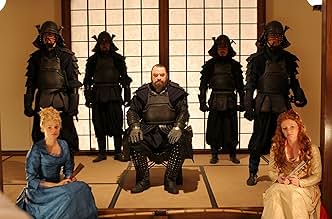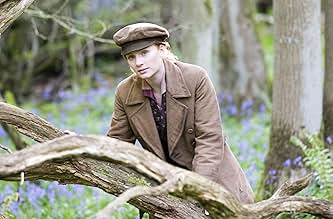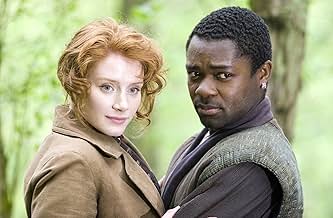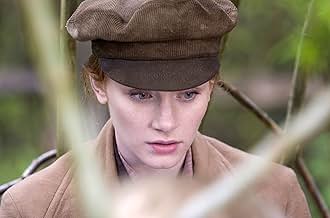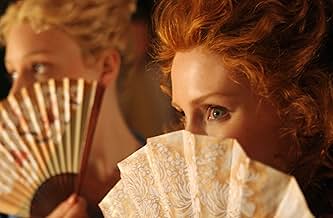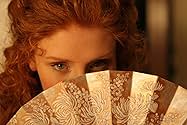CALIFICACIÓN DE IMDb
6.0/10
3.9 k
TU CALIFICACIÓN
La hija del poderoso duque debe demostrar su valentía e ingenio para estar con el hombre que ama.La hija del poderoso duque debe demostrar su valentía e ingenio para estar con el hombre que ama.La hija del poderoso duque debe demostrar su valentía e ingenio para estar con el hombre que ama.
- Dirección
- Guionistas
- Elenco
- Premios
- 1 premio ganado y 6 nominaciones en total
Nobuyuki Takano
- Charles
- (as Nobuyuki "Daishi" Takano)
- Dirección
- Guionistas
- Todo el elenco y el equipo
- Producción, taquilla y más en IMDbPro
Opiniones destacadas
Kenneth Branagh takes the Bard to Japanese setting the time being the late 19th century.As You Like It (2006) tells about Rosalind, the daughter of banished duke.She is raised by his younger brother Frederick, who took over dukedom.She falls for a young man named Orlando, but also she is soon banished by Frederick.Her cousin Celia leaves with her.They go to the forest of Arden, and they take the fool Touchtone with them.And also, Rosalind is disguised as a boy, and she goes by the name of Ganymede, while Celia goes by the name of Aliena.Also Orlando happens to be in the same forest, fleeing the wrath of his older brother.William Shakespeare wrote the original, pastoral comedy, around 1599 or 1600.I read it some time ago.Shakespeare sure knew how to write of love, and it is all well adapted to the screen here.And there are also mighty fine players in this play.Let's start with Bryce Dallas Howard, whose work as a boy is almost as good as her work as a girl.Romola Garai is a real treat as Celia.Brian Blessed is great both as Duke Frederick as he is as Duke Senior.David Oyelowo is terrific as Orlando De Boys.Adrian Lester is very good as his brother Oliver.Richard Briers gives a very fine performance of Adam.Alfred Molina is superb as Touchtone.And so is Janet McTeer as his love interest Audrey.Kevin Kline is brilliant as Jaques.Jade Jefferies is marvelous as Phebe.This may not be the funniest thing I've ever seen, nor was the play the funniest thing I've ever read.Maybe I'm too modern and should think more medievally.But it all works because of the words, and the grand feelings it has to offer.And sure I found myself slightly amused when Phebe went head over heels for Rosalind/Ganymede.Branagh shows us that Shakespeare works also in a new environment, in a new era.
On the whole, I agree with the many reviewers before me who praise Kenneth Branagh in general and "As You Like It" in specific. So, I don't have to reiterate their comments here. I am writing to rebut the review by teacher_tom516 who completely misunderstands the movie, the play and the term "suspension of disbelief." Starting with the last, Samuel Taylor Coleridge called it "the willful suspension of disbelief," the tacit agreement made by the audience to leave reality at the door of the theater and accept the production's conceit as a temporary new reality. All theater, with the exception of the mercifully brief 19th century flirtation with "Realism/Naturalism", recognizes that it is an illusion to try to present "reality" on stage. Shakespeare certainly knew that and even tells his audience this in several of his plays (Henry V, Hamlet, The Tempest, A Midsummer Night's Dream, etc etc). His comedies are allegorical -- more subtly, so are his tragedies and even histories. His audiences accepted the premise without caviling over clocks striking in "Julius Caesar" and wild animals from different continents nonchalantly coexist. Shakespeare's Forest of Arden wasn't named for the Belgian Ardennes but taken from Lodge's romance "Rosalynde," from which Shakespeare cribbed his plot and characters. It is a magical place not found on maps -- it is the "Bitter Wood" of Medieval legend, the place where humans must face themselves, with or without Yoda. Arden was also Shakespeare's mother's family name. The writer plays the name game with the characters, seemingly unaware that Shakespeare's names are often chosen for their metaphoric associations. Falstaff is a "false staff" to Prince Hal. Why Orlando? Not because it's an Italian courtier's name, but because it's the Italian translation of Roland, the name of one of two legendary brothers-in-arms in the reign of Charlemagne, immortalized in "The Song of Roland." The other brother-knight's name was... Oliver! Also, It's Jaques, not Jacques, and may have been pronounced "Jakes", Brit slang for bathroom, which might be taken as ironic since he is such a pessimist, unlike his opposite, Touchstone, whose name might be taken as the iconic test of Truth. Do the hodge-podge of names in Hamlet disturb teacher_tom516? Claudius? Polonius? Laertes? Rosencrantz and Guildenstern!?
His biggest complaint is about the Japanese setting. Obviously, he didn't read the opening on-screen explanation Mr. Branagh thoughtfully provided for the edification of anyone interested in it. Is the Meiji Japan of the imagination be any less exotic than the locale of "A Winter's Tale" -- "the coast of Bohemia."? Bohemia doesn't have a coast -- it's completely landlocked. Oh yes, how absurd a scrawny kid could throw a Sumo wrestler? That's the whole point. Ever hear of Jack the Giant-killer? Beware people who confuse the truths of fairy tales with the factoids of spreadsheets. Yes, Shakespeare plays fast and loose with facts - so do creative directors interpreting his plays. As Miguel de Cervantes said, "One should never let facts get in the way of Truth." He also said, "Facts are the enemy of Truth."
His biggest complaint is about the Japanese setting. Obviously, he didn't read the opening on-screen explanation Mr. Branagh thoughtfully provided for the edification of anyone interested in it. Is the Meiji Japan of the imagination be any less exotic than the locale of "A Winter's Tale" -- "the coast of Bohemia."? Bohemia doesn't have a coast -- it's completely landlocked. Oh yes, how absurd a scrawny kid could throw a Sumo wrestler? That's the whole point. Ever hear of Jack the Giant-killer? Beware people who confuse the truths of fairy tales with the factoids of spreadsheets. Yes, Shakespeare plays fast and loose with facts - so do creative directors interpreting his plays. As Miguel de Cervantes said, "One should never let facts get in the way of Truth." He also said, "Facts are the enemy of Truth."
How dumb do you have to be to watch a Shakespeare film and then complain, like certain reviews here, that it has Shakespeare's dialogue? What did you expect? Apart from anything else, the dialogue - the poetry of the greatest-ever writer of English - is the whole point. Without that, you have only a highly improbable story made up of contrived situations connected together only tenuously. With it - if it is well performed - a golden, magical glow of love and wit. If you don't understand it, rather than expecting it to be dumbed down to your level you should be prepared to put a bit of work in, read the play over slowly and puzzle it out - or else just admit that it is over your head. But don't blame the play for your own deficiencies.
I'm not fond, though, of the modern fashion for productions with apparently random, irrelevant concepts - in this case old-time Japan - to which Branners adds by his insistence on casting American stars who (inevitably) can't really handle the dialogue.
I'm not fond, though, of the modern fashion for productions with apparently random, irrelevant concepts - in this case old-time Japan - to which Branners adds by his insistence on casting American stars who (inevitably) can't really handle the dialogue.
Here's one of the most intriguing challenges in all the lands of imagination.
Shakespeare invented much of what it means to be a modern human. But he did so in a very constrained way of communicating. The plays were all about language and geometry on how the come to us, and within that vessel he grew images. That sparseness was what allowed him to shape the language so finely, thus creating the poetic spins that find valence in us.
Okay. If you have seen Shakespeare done as it originally was, you'll know what I mean. The plays work well when read silently or aloud as well. But how to translate to cinema? How to take something that is not visual until it enters us, and make it visual before it enters us and make the same magic?
I love how people have tried. Most modern stage productions follow this cinematic challenge as well because now we are a visual society.
Jarman, Greenaway, Luhrman and Taymor have done marvelous things with this challenge. Branaugh is from a different stripe, a sideways approach to this problem. He sometimes moves into pure cinema (Kate's mirrored Ophelia rant, the horses in "Much Ado") but he's primarily worried about stagecraft as theatrically defined. Here he does something different, something so ambitious I'm trilled to be alive for it. Its so clever.
I did not see this at an appointed time, but stumbled on it after a discouraging day. In a sense, it saved my life. It really did. I watched the whole thing with one of those openmouthed grins.
Here's what he did. He transported the setting to Japan and adjusted everything accordingly. Simple idea.
No, its not just Shakespeare with different clothes. Its not just the plot fleshed out with some other setting. Its a translation to a visual expression. Japan has spent a few hundred years building, refining and constraining a visual grammar in much the same way that Northern Europeans did with language. We lose much of what we associate with the plays, that verbal poetry. What we get in its stead is something similar but visually rooted. To establish this of course you have to "show strong" in the beginning, and he does with a completely wordless intrusion, an invasion of guess what? A play!
This Rosalind is exquisite, someone who knows how to shape the space around her the way British actors carefully shape their words. She anchors the whole thing, including an amazing epilogue. Really, you should save this for when you need your life saved, when you need to stroke down melancholy burrs.
Though Branaugh ends with his familiar happydance, by then you will be ready for it, ready to fall in love all over again.
Ted's Evaluation -- 3 of 3: Worth watching.
Shakespeare invented much of what it means to be a modern human. But he did so in a very constrained way of communicating. The plays were all about language and geometry on how the come to us, and within that vessel he grew images. That sparseness was what allowed him to shape the language so finely, thus creating the poetic spins that find valence in us.
Okay. If you have seen Shakespeare done as it originally was, you'll know what I mean. The plays work well when read silently or aloud as well. But how to translate to cinema? How to take something that is not visual until it enters us, and make it visual before it enters us and make the same magic?
I love how people have tried. Most modern stage productions follow this cinematic challenge as well because now we are a visual society.
Jarman, Greenaway, Luhrman and Taymor have done marvelous things with this challenge. Branaugh is from a different stripe, a sideways approach to this problem. He sometimes moves into pure cinema (Kate's mirrored Ophelia rant, the horses in "Much Ado") but he's primarily worried about stagecraft as theatrically defined. Here he does something different, something so ambitious I'm trilled to be alive for it. Its so clever.
I did not see this at an appointed time, but stumbled on it after a discouraging day. In a sense, it saved my life. It really did. I watched the whole thing with one of those openmouthed grins.
Here's what he did. He transported the setting to Japan and adjusted everything accordingly. Simple idea.
No, its not just Shakespeare with different clothes. Its not just the plot fleshed out with some other setting. Its a translation to a visual expression. Japan has spent a few hundred years building, refining and constraining a visual grammar in much the same way that Northern Europeans did with language. We lose much of what we associate with the plays, that verbal poetry. What we get in its stead is something similar but visually rooted. To establish this of course you have to "show strong" in the beginning, and he does with a completely wordless intrusion, an invasion of guess what? A play!
This Rosalind is exquisite, someone who knows how to shape the space around her the way British actors carefully shape their words. She anchors the whole thing, including an amazing epilogue. Really, you should save this for when you need your life saved, when you need to stroke down melancholy burrs.
Though Branaugh ends with his familiar happydance, by then you will be ready for it, ready to fall in love all over again.
Ted's Evaluation -- 3 of 3: Worth watching.
An overthrown local monarch takes to the woods with a handful of loyal followers. His daughter also flees also, at a different time, following her true love (but dressed as a man). Only in Shakespeare do fathers/brothers/lovers not recognize each other because they're in different clothes.
Kenneth Branagh is good. He's very good. In fact, he's darn good. But he's not as good as he thinks.
He made a slight shift in locations for "Much Ado About Nothing" and it worked better than he could have hoped. He set Hamlet in a Ruritanian Denmark. Fine. I enjoyed it (helped along, I think, by the fact that I was just coming down with flu in 1996 and during the movie show my temperature shot up to 103).
But setting "As You Like It" in Japan was a risk. It also may be the only version some people ever see, which is a perversion. Whether it works is, of course, subjective. The movie's not bad but downbeat for a comedy. See it and make up your own mind.
(Fortunately, in "The Shakespeare Plays," comedies came out best, and the more conventional "As You Like It" with Helen Mirren is still wonderful, as is the Jacobean-set "Twelfth Night" with Felicity Kendall and the "Much Ado" with Cherie Lunghi; so anyone wanting more Shakespearean interpretations of these Shakespeare plays have those to fall back on. Get a region-free dvd/blu-ray player, if necessary.)
This version has Branagh's typical mix of his stock company (Brian Blessed, Richard Briars) and currently popular stars given a chance to display their acting chops. Some work better than others. In previous efforts Denzell Washington and Charlton Heston came off well; Keenu Reeves and Jack Lemmon, less so.
Shakespeare grew up near the forest of Arden and no doubt played there (as I did in a huge woods I grew up adjacent to) and remembered it in his manhood as a mystical place (as I do mine). He embued it with wonder, so much so the eggheads insist it's not that forest of Arden where "As You Like It" took place but in another of the same name. What was I saying about fathers and lovers not recognizing loved ones in different clothes? It's the same sort of thing.
I wished Branagh had made more Shakespeare in the 1990s when it was popular; but now I'm not so sure. Of course, funding is always a problem.
This version of "As You Like It" has one serious lack: Branagh himself. I like seeing him around but he remains behind the camera. I never wanted "Henry V," "Much Ado," and "Hamlet" to end. I watched the clock on this one.
But this version has a nice surprise ending. Stick around.
Kenneth Branagh is good. He's very good. In fact, he's darn good. But he's not as good as he thinks.
He made a slight shift in locations for "Much Ado About Nothing" and it worked better than he could have hoped. He set Hamlet in a Ruritanian Denmark. Fine. I enjoyed it (helped along, I think, by the fact that I was just coming down with flu in 1996 and during the movie show my temperature shot up to 103).
But setting "As You Like It" in Japan was a risk. It also may be the only version some people ever see, which is a perversion. Whether it works is, of course, subjective. The movie's not bad but downbeat for a comedy. See it and make up your own mind.
(Fortunately, in "The Shakespeare Plays," comedies came out best, and the more conventional "As You Like It" with Helen Mirren is still wonderful, as is the Jacobean-set "Twelfth Night" with Felicity Kendall and the "Much Ado" with Cherie Lunghi; so anyone wanting more Shakespearean interpretations of these Shakespeare plays have those to fall back on. Get a region-free dvd/blu-ray player, if necessary.)
This version has Branagh's typical mix of his stock company (Brian Blessed, Richard Briars) and currently popular stars given a chance to display their acting chops. Some work better than others. In previous efforts Denzell Washington and Charlton Heston came off well; Keenu Reeves and Jack Lemmon, less so.
Shakespeare grew up near the forest of Arden and no doubt played there (as I did in a huge woods I grew up adjacent to) and remembered it in his manhood as a mystical place (as I do mine). He embued it with wonder, so much so the eggheads insist it's not that forest of Arden where "As You Like It" took place but in another of the same name. What was I saying about fathers and lovers not recognizing loved ones in different clothes? It's the same sort of thing.
I wished Branagh had made more Shakespeare in the 1990s when it was popular; but now I'm not so sure. Of course, funding is always a problem.
This version of "As You Like It" has one serious lack: Branagh himself. I like seeing him around but he remains behind the camera. I never wanted "Henry V," "Much Ado," and "Hamlet" to end. I watched the clock on this one.
But this version has a nice surprise ending. Stick around.
¿Sabías que…?
- TriviaThis was the ninth and final film directed by Kenneth Branagh in which Richard Briers stars. The others are Enrique V (1989), Peter's Friends (1992), Swan Song (1992), Tanto para nada (1993), Frankenstein (1994), Sueño de una Noche de Invierno (1995), Hamlet (1996) and Pacto de amor (2000).
- ErroresLions are not native to Japan. The lion is a carryover from the original play, which was set in a generic European country at an indeterminate time in the Middle Ages. Even that didn't make much sense, as lions have been extirpated from the main part of Europe since the 4th century AD, and from the Caucasus since the 10th century. But many Europeans, possibly including William Shakespeare, didn't know that lions weren't around anymore.
- Citas
Touchstone: The fool doth think he is wise, but the wise man knows himself to be a fool.
- Créditos curiososThe picture seems to end without the play's Epilogue. Then, the closing credits begin, when they are suddenly interrupted by Bryce Dallas Howard, still in character as Rosalind, who then is seen speaking the Epilogue as she begins to walk to her trailer, drinking a cup of coffee along the way. After the speech, Kenneth Branagh can be heard off-screen saying "Aaaand...cut!" After this, the closing credits resume.
- Versiones alternativasThe version shown on cable television has been formatted to the aspect ratio commonly used in HDTV production (that is, anywhere from 1.78:1 to 1.85:1), while the version released to movie theatres was released in the typical CinemaScope/Panavision aspect ratio (2.39:1). It is the theatrical version which has been issued on DVD. Since the film was made using the Super 35 format, it was possible to make versions of the film in different aspect ratios.
- ConexionesFeatured in 14th Annual Screen Actors Guild Awards (2008)
- Bandas sonorasUnder the Greenwood Tree
Composed by Patrick Doyle
Lyrics by William Shakespeare
Performed by Patrick Doyle and London Symphony Orchestra
Selecciones populares
Inicia sesión para calificar y agrega a la lista de videos para obtener recomendaciones personalizadas
- How long is As You Like It?Con tecnología de Alexa
Detalles
- Fecha de lanzamiento
- Países de origen
- Idioma
- También se conoce como
- As You Like It
- Locaciones de filmación
- Productoras
- Ver más créditos de la compañía en IMDbPro
Taquilla
- Total a nivel mundial
- USD 563,162
- Tiempo de ejecución2 horas 7 minutos
- Color
- Mezcla de sonido
Contribuir a esta página
Sugiere una edición o agrega el contenido que falta

Principales brechas de datos
By what name was Como gustéis (2006) officially released in India in English?
Responda



